Module 6 Unit 1 It allows people to get closer to them .第二课时课件(共21张PPT)
文档属性
| 名称 | Module 6 Unit 1 It allows people to get closer to them .第二课时课件(共21张PPT) |
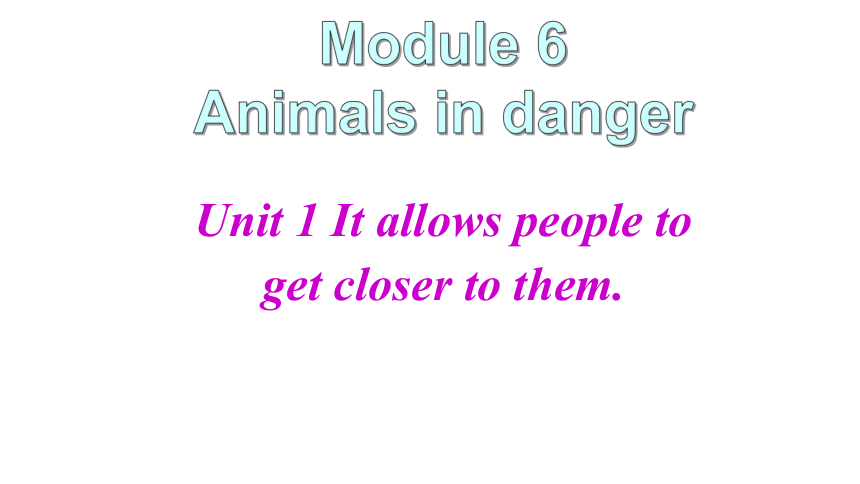
|
|
| 格式 | pptx | ||
| 文件大小 | 436.2KB | ||
| 资源类型 | 教案 | ||
| 版本资源 | 外研版 | ||
| 科目 | 英语 | ||
| 更新时间 | 2024-10-29 00:00:00 | ||
图片预览




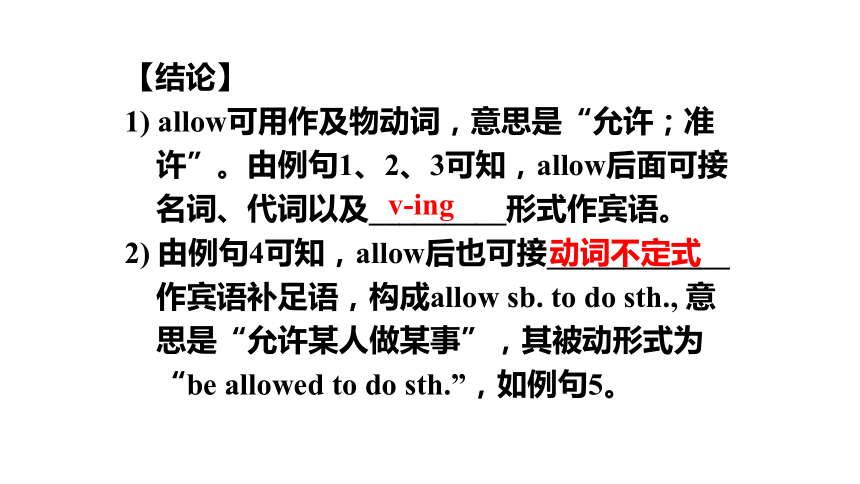
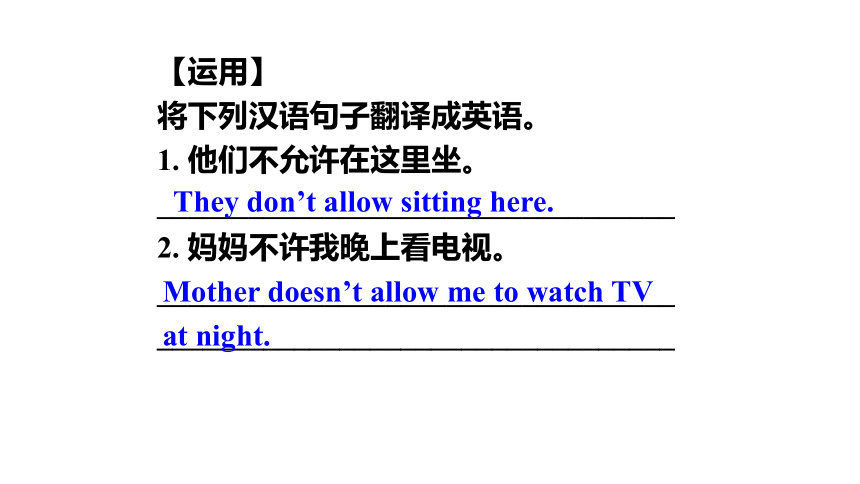

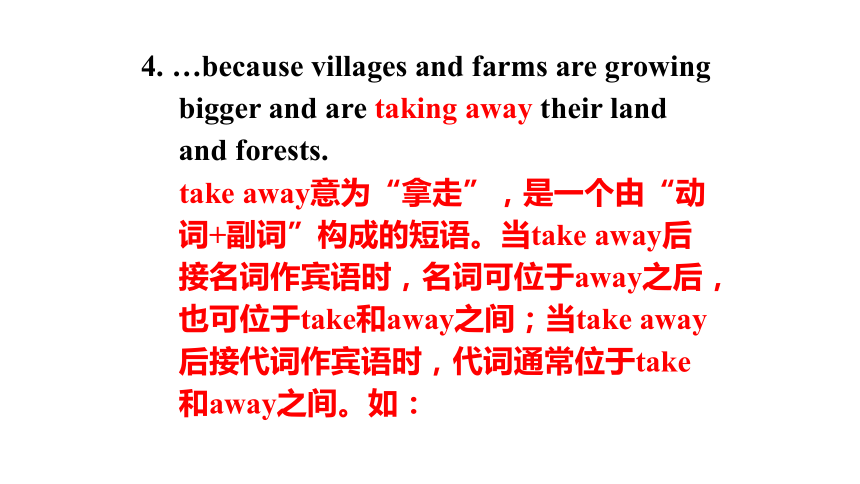
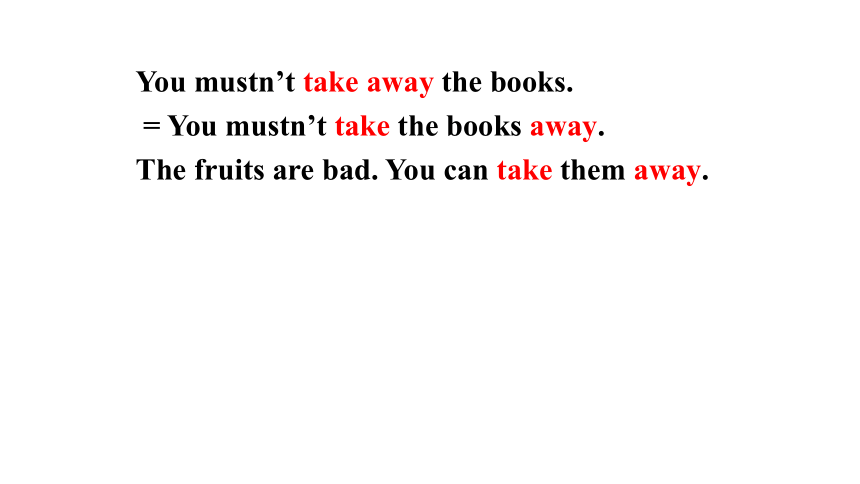
文档简介
(共21张PPT)
Module 6
Animals in danger
Unit 1 It allows people to get closer to them.
1. But I am more interested to see the
pandas in the Wolong Panda Reserve...
be interested to do sth.
“对做……感兴趣”
be interested in sth. 对……感兴趣
主语通常为人,其后可接名词(短语)、代词或动词-ing形式。
e.g. The boy is interested in the film.
The TV show is funny. I’m interested in it.
Molly and her sister are interested in swimming.
【运用】根据汉语意思完成英语句子,每空一词。
(1) 汤姆的弟弟对篮球感兴趣。
Tom’s brother __ ________ __ basketball.
(2) 他们对唱歌感兴趣。
They __ ________ __ _______.
is interested in
is interested in singing
2. …because it allows people to get closer to them.
仔细观察下面例句中allow的用法,然后补全结
论部分所缺的内容。
1) We cannot allow a thing like this.
2) My parents wouldn’t allow it.
3) They don’t allow smoking in the kitchen.
4) His parents don’t allow him to play computer
games.
5) We aren’t allowed to wear strange clothes in
school.
【结论】
1) allow可用作及物动词,意思是“允许;准许”。由例句1、2、3可知,allow后面可接名词、代词以及_________形式作宾语。
2) 由例句4可知,allow后也可接____________作宾语补足语,构成allow sb. to do sth., 意思是“允许某人做某事”,其被动形式为“be allowed to do sth.”,如例句5。
v-ing
动词不定式
【运用】
将下列汉语句子翻译成英语。
1. 他们不允许在这里坐。
__________________________________
2. 妈妈不许我晚上看电视。
__________________________________
__________________________________
They don’t allow sitting here.
Mother doesn’t allow me to watch TV at night.
3. It’s sad to think of pandas and other animals in danger.
think of 想到,想出
e.g. What do you think of the zoo
in danger 处于险境,处于危险之中
e.g. The girl is very ill and her life is
in danger.
4. …because villages and farms are growing bigger and are taking away their land and forests.
take away意为“拿走”,是一个由“动词+副词”构成的短语。当take away后接名词作宾语时,名词可位于away之后,也可位于take和away之间;当take away后接代词作宾语时,代词通常位于take和away之间。如:
You mustn’t take away the books.
= You mustn’t take the books away.
The fruits are bad. You can take them away.
5. Also, often there isn’t enough clean water.
enough作形容词,意为“充足的;足够
的”,可作表语。例如:
Forty yuan is enough for the trip.
enough作定语,修饰名词时,可以放在
名词的前面或后面。例如:
I don’t have enough money / money
enough to buy this skirt.
另外,enough可以作副词,修饰形容词
或副词,通常放在被修饰词的后面。例
如:
Is your room warm enough
He knows the situation well enough.
【运用】根据汉语意思完成下列英语句子,每空一词。
1. 会议室里有足够的座位。
There are ______ _____ in the meeting room.
2. 五个人就足够了。
Five people ___ _______.
3. 你已经足够大了,可以照顾自己了。
You are ___ _______ to take care of yourself.
enough seats
are enough
old enough
6. Maybe we can raise some money at school.
raise v. 筹集(钱款);抚养,养育
e.g. We are raising money for charity.
【辨析】rise和raise
【形式区分】rise和raise有一个字母之差。
【读音区分】rise读作/raiz/,而raise读作/reiz/。
【词性区分】rise常作不及物动词,而raise常作及物动词。
【语义区分】rise有“上升;升起;上涨”等意思,而raise有“举起;抬起;饲养;筹集”等意思。例如:
The moon rises.
We are surprised that the price of the house is rising so rapidly.
He raised his head and looked at the blackboard.
His mother raised many ducks on the farm.
They are raising money for Project Hope.
1. Because it allows people to get closer to them.
2. It’s sad to think of the pandas and other animals in danger.
3. We need to protect them better.
4. Many wild animals don’t have a safe
place to live.
5. We want to save animals in danger.
比一比,看哪组在对话中所找的含有动词不定式的句子最多。
6. That means we can give money to help protect the animals.
7. Let’s find out what else we can do to
save as many as animals as possible.
动词不定式的功能
1. 动词不定式做宾语补足语。
动词不定式作宾语补足语,是对宾语的补充说明。常见的动词有:want, tell, would like, choose, allow, ask, invite, help等。
注意:1) 以上动词后接不定式做宾语补足语时,若要表达否定意思,要在to do前面加not,构成not to do的形式。
e.g. Mr. Han told us not to make too much
noise.
2) 有些动词后接不定式做宾语补足语时,可以接不带to的不定式,常见的这类动词有:help, make, let, have, hear, feel, see等。
e.g. His words made everyone laugh.
2. 动词不定式作目的状语。
如果表示“做某事是为了什么”,可以用动词不定式表示目的,作目的状语。
e.g. Dylan trained hard to improve his
basketball skills.
Ⅰ. 根据句意及所给汉语提示写出句中所缺单词。
1. There are lots of ________ (蛇) in the tree.
2. What is Jimmy going to be when he ________
(生长) up
3. Now Mr Zhao is ________ (筹集) money for
poor students.
4. At the weekend my mother ________ (允许)
me to go out.
5. There are two ________ (告示) over there.
snakes
grows
raising
allows
notices
6. I think this piece of ice is ________ (薄的)
than that piece.
Ⅱ. 根据语境选出恰当的单词填空,每词限用一次。
neck, interested, protect, enough, peace, wild
1. I think people all over the world love
________.
2. The giraffe’s ________ is very long.
3. Don’t worry. We have ________ time to get
there.
4. What made you ________ in dancing
thinner
peace
neck
enough
interested
neck, interested, protect, enough, peace, wild
5. We should try our best to ________ our
earth, OK
6. ________ animals all look for food by
themselves.
Ⅲ. 根据汉语意思完成英语句子,每空一词。
1. 谁能帮助濒危植物?
Who can help plants __ ________
2. 你看到格林夫人时,你想起了谁?
Who did you _____ __ when you
saw Mrs Green
protect
Wild
in danger
think of
3. 妈妈,狗把我的汉堡包夺走了。
Mum, the dog ____ _____ my hamburger.
4. 昨天莉莉帮助我照顾我的狗了。
Yesterday Lily helped me
____ ____ my dog.
5. 大家需要帮助这些贫穷的孩子平静地生活。
Everyone needs to help these poor children
live __ ______.
6. 他们仅仅需要一个安全的地方。
They only need a(n) ___ _____.
took away
look after
in peace
safe place
Module 6
Animals in danger
Unit 1 It allows people to get closer to them.
1. But I am more interested to see the
pandas in the Wolong Panda Reserve...
be interested to do sth.
“对做……感兴趣”
be interested in sth. 对……感兴趣
主语通常为人,其后可接名词(短语)、代词或动词-ing形式。
e.g. The boy is interested in the film.
The TV show is funny. I’m interested in it.
Molly and her sister are interested in swimming.
【运用】根据汉语意思完成英语句子,每空一词。
(1) 汤姆的弟弟对篮球感兴趣。
Tom’s brother __ ________ __ basketball.
(2) 他们对唱歌感兴趣。
They __ ________ __ _______.
is interested in
is interested in singing
2. …because it allows people to get closer to them.
仔细观察下面例句中allow的用法,然后补全结
论部分所缺的内容。
1) We cannot allow a thing like this.
2) My parents wouldn’t allow it.
3) They don’t allow smoking in the kitchen.
4) His parents don’t allow him to play computer
games.
5) We aren’t allowed to wear strange clothes in
school.
【结论】
1) allow可用作及物动词,意思是“允许;准许”。由例句1、2、3可知,allow后面可接名词、代词以及_________形式作宾语。
2) 由例句4可知,allow后也可接____________作宾语补足语,构成allow sb. to do sth., 意思是“允许某人做某事”,其被动形式为“be allowed to do sth.”,如例句5。
v-ing
动词不定式
【运用】
将下列汉语句子翻译成英语。
1. 他们不允许在这里坐。
__________________________________
2. 妈妈不许我晚上看电视。
__________________________________
__________________________________
They don’t allow sitting here.
Mother doesn’t allow me to watch TV at night.
3. It’s sad to think of pandas and other animals in danger.
think of 想到,想出
e.g. What do you think of the zoo
in danger 处于险境,处于危险之中
e.g. The girl is very ill and her life is
in danger.
4. …because villages and farms are growing bigger and are taking away their land and forests.
take away意为“拿走”,是一个由“动词+副词”构成的短语。当take away后接名词作宾语时,名词可位于away之后,也可位于take和away之间;当take away后接代词作宾语时,代词通常位于take和away之间。如:
You mustn’t take away the books.
= You mustn’t take the books away.
The fruits are bad. You can take them away.
5. Also, often there isn’t enough clean water.
enough作形容词,意为“充足的;足够
的”,可作表语。例如:
Forty yuan is enough for the trip.
enough作定语,修饰名词时,可以放在
名词的前面或后面。例如:
I don’t have enough money / money
enough to buy this skirt.
另外,enough可以作副词,修饰形容词
或副词,通常放在被修饰词的后面。例
如:
Is your room warm enough
He knows the situation well enough.
【运用】根据汉语意思完成下列英语句子,每空一词。
1. 会议室里有足够的座位。
There are ______ _____ in the meeting room.
2. 五个人就足够了。
Five people ___ _______.
3. 你已经足够大了,可以照顾自己了。
You are ___ _______ to take care of yourself.
enough seats
are enough
old enough
6. Maybe we can raise some money at school.
raise v. 筹集(钱款);抚养,养育
e.g. We are raising money for charity.
【辨析】rise和raise
【形式区分】rise和raise有一个字母之差。
【读音区分】rise读作/raiz/,而raise读作/reiz/。
【词性区分】rise常作不及物动词,而raise常作及物动词。
【语义区分】rise有“上升;升起;上涨”等意思,而raise有“举起;抬起;饲养;筹集”等意思。例如:
The moon rises.
We are surprised that the price of the house is rising so rapidly.
He raised his head and looked at the blackboard.
His mother raised many ducks on the farm.
They are raising money for Project Hope.
1. Because it allows people to get closer to them.
2. It’s sad to think of the pandas and other animals in danger.
3. We need to protect them better.
4. Many wild animals don’t have a safe
place to live.
5. We want to save animals in danger.
比一比,看哪组在对话中所找的含有动词不定式的句子最多。
6. That means we can give money to help protect the animals.
7. Let’s find out what else we can do to
save as many as animals as possible.
动词不定式的功能
1. 动词不定式做宾语补足语。
动词不定式作宾语补足语,是对宾语的补充说明。常见的动词有:want, tell, would like, choose, allow, ask, invite, help等。
注意:1) 以上动词后接不定式做宾语补足语时,若要表达否定意思,要在to do前面加not,构成not to do的形式。
e.g. Mr. Han told us not to make too much
noise.
2) 有些动词后接不定式做宾语补足语时,可以接不带to的不定式,常见的这类动词有:help, make, let, have, hear, feel, see等。
e.g. His words made everyone laugh.
2. 动词不定式作目的状语。
如果表示“做某事是为了什么”,可以用动词不定式表示目的,作目的状语。
e.g. Dylan trained hard to improve his
basketball skills.
Ⅰ. 根据句意及所给汉语提示写出句中所缺单词。
1. There are lots of ________ (蛇) in the tree.
2. What is Jimmy going to be when he ________
(生长) up
3. Now Mr Zhao is ________ (筹集) money for
poor students.
4. At the weekend my mother ________ (允许)
me to go out.
5. There are two ________ (告示) over there.
snakes
grows
raising
allows
notices
6. I think this piece of ice is ________ (薄的)
than that piece.
Ⅱ. 根据语境选出恰当的单词填空,每词限用一次。
neck, interested, protect, enough, peace, wild
1. I think people all over the world love
________.
2. The giraffe’s ________ is very long.
3. Don’t worry. We have ________ time to get
there.
4. What made you ________ in dancing
thinner
peace
neck
enough
interested
neck, interested, protect, enough, peace, wild
5. We should try our best to ________ our
earth, OK
6. ________ animals all look for food by
themselves.
Ⅲ. 根据汉语意思完成英语句子,每空一词。
1. 谁能帮助濒危植物?
Who can help plants __ ________
2. 你看到格林夫人时,你想起了谁?
Who did you _____ __ when you
saw Mrs Green
protect
Wild
in danger
think of
3. 妈妈,狗把我的汉堡包夺走了。
Mum, the dog ____ _____ my hamburger.
4. 昨天莉莉帮助我照顾我的狗了。
Yesterday Lily helped me
____ ____ my dog.
5. 大家需要帮助这些贫穷的孩子平静地生活。
Everyone needs to help these poor children
live __ ______.
6. 他们仅仅需要一个安全的地方。
They only need a(n) ___ _____.
took away
look after
in peace
safe place
同课章节目录
- Module 1 How to learn English
- Unit 1 Let's try to speak English as much as possi
- Unit 2 You should smile at her.
- Unit 3 Language in use .
- Module 2 My home town and my country
- Unit 1 It's taller than many other buildings.
- Unit 2 Cambridge is a beautiful city in the east o
- Unit 3 Language in use .
- Module 3 Sports.
- Unit 1 Nothing is more exciting than playing tenni
- Unit 2 This year we training more carefully.
- Unit 3 Language in use .
- Module 4 Planes, ships and trains .
- Unit 1 He lives the farthest from school.
- Unit 2 What is the best way to travel.
- Unit 3 Language in use .
- Module 5 Lao She Teahouse.
- Unit 1 I wanted to see the Beijing Opera.
- Unit 2 It descibes the changes in Chinese society.
- Unit 3 Language in use .
- Module 6 Animals in danger.
- Unit 1 It allows people to get closer to them .
- Unit 2 The WWF is working hard to save them all.
- Unit 3 Language in use .
- Revision module A
- Module 7 A famous story
- Unit 1 Alice was sitting with her sister by the ri
- Unit 2 She was thinking about her cat.
- Unit 3 Language in use .
- Module 8 Accidents
- Unit 1 While the car were changing to red, a car s
- Unit 2 I was trying to pick it up when it bite me
- Unit 3 Language in use .
- Module 9 Population
- Unit 1 The population of China is about 1.37 billi
- Unit 2 Arnwick was a city with 200,000 people.
- Unit 3 Language in use .
- Module 10 The weathe
- Unit 1 It might snow.
- Unit 2 The weather is fine all year round.
- Unit 3 Language in use .
- Module 11 Way of life
- Unit 1 In China ,we open a gift later.
- Unit 2 In England, you usually drink tea with milk
- Unit 3 Language in use .
- Module 12 Help
- Unit 1 What should we do before help arrives?
- Unit 2 Stay away from windows and heavy furniture.
- Unit 3 Language in use .
- Revision module B
